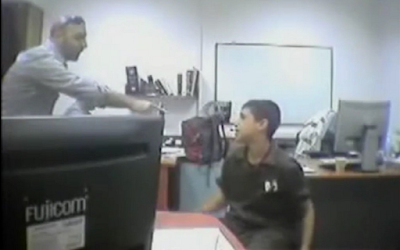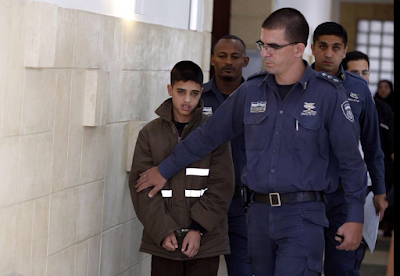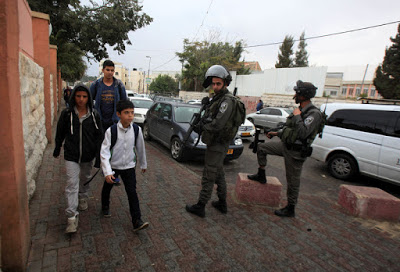say anything other than that this film says everything you need to know about Israeli
racism. The idea that such behaviour
would be tolerated if it was a Jewish child is too absurd even to
contemplate. The Jew who stabbed another
Jew by mistake, he meant to stab an Arab, was granted anonymity by the court
and remanded for psychological reports. Palestinians
don’t get psychological reports, just beatings and torture.
Rights Expert: Harsh interrogation of 13-year-old Palestinian boy ‘may amount to torture’
Hanna on November 13, 2015
 |
| Still of film showing Amhad Manasra’s interrogation leaked by Ma’an (Source: Twitter) |
controversial video was leaked to Palestinian media on November 8th, revealing
an aggressive Israeli security interrogation of 13-year old Ahmad Manasra, who
was indicted on October 30th by Israel’s Jerusalem District Court for
attempting to murder two Israelis near the Pisgat Zeev settlement in East
Jerusalem.
10-minute video depicts an Israeli interrogator verbally abusing and shouting
curses at the visibly distressed boy, rigorously questioning his motives and
accusing him of murder. The video then appears to show the young teen
confessing to the crime under considerable duress.
the footage has gone viral there has been a strong public outrage, with
rights-based groups condemning what appears to be a violation of the rights
afforded to the treatment of minors in custody.
Parker, attorney and international advocacy officer at Defence for Children –
Palestine, spoke to Mondoweiss about the legal implications of the film.
“The circumstances depicted in the video
present a situation that may amount to torture” he explained. “When determining if certain acts constitute
torture, the child’s age must be taken into account. Israeli interrogators are
seen relying on verbal abuse, intimidation and threats to apparently inflict
mental suffering for the purpose of obtaining a confession.”
stated that the video provides evidence of a violation of international juvenile
standards as dictated by the UN Convention on the Rights of the Child, which
Israel signed in 1991. According to Parker, “[the
Convention] prohibits torture and other cruel, inhuman or degrading treatment
or punishment. This prohibition is absolute, yet, ill treatment and torture of
Palestinian children arrested by Israeli military and police is widespread and
systematic.”
these fundamental rights which appear to have been neglected, international law
states that a child cannot be interrogated without the presence of his parents
or guardian. Tareq Barghouth, one of Manasra’s lawyers, claims that the boy has
not been allowed contact with his family since the attack, and has been
subjected to psychological abuse from the security forces. “They threatened that they will kill him, demolish his house, and
imprison him,” Barghouth said. “They
spit on him. One of the officials opened his Skype with his girlfriend, and she
also began swearing at him over Skype.”
contentious aspect of Manasra’s treatment since arrest was the decision by the
Israeli government to publicly release his photograph. The Israeli NGO
Physicians for Human Rights denounced the
move as inherently political saying, “the
fact that it is a photo of a minor in custody who was photographed without his
parents’ permission” is a violation of juvenile law and privacy laws… Even
more disturbing, is that reportedly the instructions [to publish the photo]
came directly from the office of the Health Minister [Yaakov Litzman] and that
the picture itself was distributed by the Prime Minister’s Office.”
the video of the interrogation, an officer sits behind a desk shouting at the
boy in Arabic, “Why did you stab him? Why did you stab him?”
anguished Manasra pleads and repeatedly hits his head with his hands, saying
that he cannot remember and begs with the interrogator to believe him, saying “I don’t remember, not one thing. For God’s
sake believe me! I woke up the next day at four. There was a blow to my head. I
don’t remember! What is happening to me?”
the barrage of shouting and curses, Manasra can be heard saying “maybe I am going crazy”, and asks the
officer to “take me to the doctor to
check me”, all the while screaming and hitting his face with his hands.
officer continuously yells “liar!”,
and tells Manasra to “shut up”,
saying that he is accused of killing “two
Jews” and that he supported “the
enemy in time of war”. The boy is clearly confused by the statement,
and asks “what war? What do I have to do
with a war”?
interrogator proceeds to violently yell at Manasra, who eventually says, “everything you say is true, according to the
video it is true. But I don’t remember… I only believe that it happened when I
saw the footage.”
admitting to the crime, Parker told Mondoweiss that the context of
coercion negates the validity of the confession. “International law demands that any statement made as a result of
torture or ill-treatment must be excluded as evidence in any proceeding” he
explained; “ any confession or
incriminating statements made by Ahmad as a result of torture must not be used
as evidence against him.”
the release of the interrogation footage the case made headlines when
Palestinian President Mahmoud Abbas mistakenly stated that Israeli security
forces had executed Ahmad Manasra after the stabbing attack. During the
incident, which occurred on October 12th, two Israel’s aged 13 and 21 were
seriously injured and Manasra’s 15-year old cousin, Hassan, was shot dead by
Israeli forces. A car knocked Mansara down as he tried to flee the scene.
disturbing film shot by a passer by of the immediate aftermath of the attack
also went viral, showing Mansara’s small body splayed on the sidewalk in a pool
of blood, as onlookers yell at him “Die,
son of a b***h die!”
to local news source Ma’an, the court rejected the family’s pleas that Manasra
be placed under house arrest. Instead, he will be detained in a closed facility
in Galilee until his prosecution, with his next court date set for December
6th.
current Israeli legislation, Manasra cannot serve a prison sentence until he
turns 14 in January, after which he could face years of incarceration. However
this particular case has prompted the Israeli Justice Ministry to draft a bill
a few days ago, in which children as young as 12 could be given prison
sentences if convicted of manslaughter, murder or attempted murder. The bill
will apply to Palestinian residents of Jerusalem, despite the fact they are not
citizens of the state of Israel.
it doesn’t seem as if Manasra will be the last of such cases involving
Palestinian minors. 12-year old Ali Ihab Hassab Ali
was shot three times after stabbing an Israeli guard in Jerusalem yesterday,
and is currently being held under Israeli police custody in Hadassah hospital.
 |
| Ahmad Manasra being led by Israeli authorities in a detention facility (Source: Twitter) |
and detaining Palestinian children without a trial in the Israeli military
courts is a common method employed by Israeli forces in an attempt to deter
involvement in resistance or violence. According to the human rights
association Addameer, approximately 700 Palestinian children under the age of
18 are arrested, interrogated and detained by the Israeli army every year.
Indeed, the Israeli military raided a home in Hebron
last month, seeking to arrest a Palestinian boy accused of throwing stones only
to discover he was 3-years old.
a report released
in July 2015, Human Rights Watch stated that “Israeli security forces have used unnecessary force to arrest or
detain Palestinian children as young as 11”, including choking them, throwing
stun grenades at them, beating them in custody and interrogating them without
the presence of parents or lawyers.
children, Parker stated that “ill-treatment and torture of Palestinian children
in Israeli military detention is widespread with around 75 percent of kids
arrested from the West Bank suffering some form of physical violence during
arrest, transfer or interrogation. Despite repeated calls to end ill-treatment
and torture of Palestinian children in Israeli detention, Israel has
persistently failed to implement practical changes to stop violence against
child detainees.”
date 77 Palestinians have been killed since the beginning of last month, 13 of
whom are children killed by Israeli forces in what are being condemned by
rights groups such as Amnesty International as “unlawful” killings which
resemble “extra judicial execution”. The increased use of extreme methods
harnessed by the Israeli military in reaction to the current spate of violence
raises grave concerns over how Palestinian minors are treated, under a judicial
apparatus notorious for the systematic ill-treatment of children.
Israel strip-searches children in new detention center
 |
| Palestinian schoolchildren walk past Israeli forces in occupied East Jerusalem in late October. Mahfouz Abu Turk APA images |
Israel has arrested so many Palestinian children since the start of October
that is has opened a new detention center specifically for them. The center is
part of Givon Prison
in Ramle, a city in present-day Israel.
Children from the occupied West Bank, including East Jerusalem,
are being held there in conditions that violate their human rights.
A spokesperson for the Israel Prison
Service told The Electronic Intifada that the newly opened facility at
Givon prison is temporary and fulfills standards for detaining children.
But lawyers who have visited the imprisoned children there warn of
overcrowding, poor hygiene and mistreatment.
A total of 56 Palestinian children are being held in Givon, 20 of whom are
from the West Bank, according to the Palestinian prisoner advocacy group Addameer.
It is a violation
of the Fourth
Geneva Convention to transfer prisoners out of the occupied West Bank or
Gaza into present-day Israel.
Lawyers with the Public
Committee Against Torture in Israel and Defense
for Children International-Palestine are also investigating the prison’s
conditions.
Israel arrested
177 Palestinian children in October, more than doubling the number of child
prisoners already held, according to human rights groups.
However, many more children from East Jerusalem have been briefly detained
and released on house arrest and other conditions since last month.
“Suffocating”
According to lawyers, the cells in Givon are moldy and very little food is
provided to the inmates. In at least one instance, the guards cut the electricity
for several hours and confiscated food the children had bought from the
canteen.
On 1 November, the cells were raided and every child was shackled, stripped
and searched inside the prison bathroom. During the raid, the guards physically
and verbally abused the children while ransacking their cells.
Addameer is concerned that the children detained at Givon are supervised
directly by the prison guards and are therefore vulnerable to abuse.
The group has received reports of physical violence against the children
which may constitute torture under international law.
One Palestinian minor from East Jerusalem who was arrested in July was
transferred to Givon in the middle of October.
His mother told The Electronic Intifada she only discovered he had been
transferred when she tried to visit him at Hasharon,
another prison inside Israel where Palestinian minors and women are usually
jailed. The mother contacted the International Committee of the
Red Cross to find out where her son was being held.
Lawyers representing the family have requested their identity be kept
anonymous due to fears of retaliation from the Israeli authorities.
On 20 October, the mother traveled to Givon, where dozens of families waited
in the rain to see their children. She said they arrived in the late morning
and waited until after dark to be allowed in.
“It was terrible how they treated us,” she said, noting that they watched
more buses of children being brought in as they waited.
Once they were allowed to enter the facility, the families had to divide
among themselves the 30 minutes they were allotted to speak to their children
on a phone through a plexiglass screen.
Her son, who has yet to be sentenced, told her that the conditions were
significantly worse in Givon than in Hasharon. Children in Givon are receiving
inadequate food and are not allowed to go outside for breaks.
“We are suffocating,” he told her.
“We don’t know how to feel and what to think,” she said. “The people
who are making the laws are killing people these days.”
The boy’s father tried to visit less than two weeks later. He was told that
his son and seven other boys had their visiting privileges revoked. He was not
told why they were being punished.
“What will Israel gain after imprisoning my son other than more hatred
and anger?” he asked.
Givon mainly houses people awaiting deportation and low-level criminals.
In 2012, Israel began imprisoning
unaccompanied minors from Africa in Givon. The children had been seeking asylum
in Israel.
Refugee rights groups protested the move at the time, citing a 2011 Israeli high
court ruling against minors being held in prison.
In August that year, Israel’s public defenders reported
abysmal conditions at Givon. The cells, beds and yard were infested with
cockroaches. The cells also had very little sunlight or ventilation.
8-year-olds detained
Scores of Palestinian minors in East Jerusalem have been detained for brief
periods recently.
In order to accommodate the mass detentions, Israel converted the Oz police
station in Jerusalem into an interrogation center.
According to Addameer, there is currently such a high rate of children being
held for brief periods in Oz that the organization is unable to maintain
accurate statistics on how many minors have been detained and released on house
arrest.
“That’s the problem. There were so many arrests during October and the
beginning of November, we couldn’t follow up on all the cases,” Rafat Sub
Laban, an Addameer campaigner, said.
Children as young as 7 or 8 have reportedly been detained at Oz
without the presence of their parents, a violation of the Israeli Youth Law
that prohibits
the interrogation and detention of children under the age of 12.
Several children profiled by Addameer had been picked up off the street and
beaten during their arrest and interrogation at Oz.
In addition to being released on house arrest, one child was told that he was
forbidden to speak to a list of 15 friends and relations.
Charlotte Silver is a journalist based in Oakland, California. Twitter: @CharESilver.